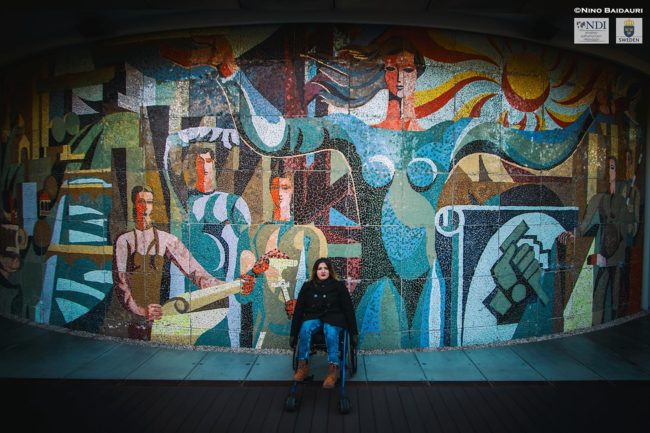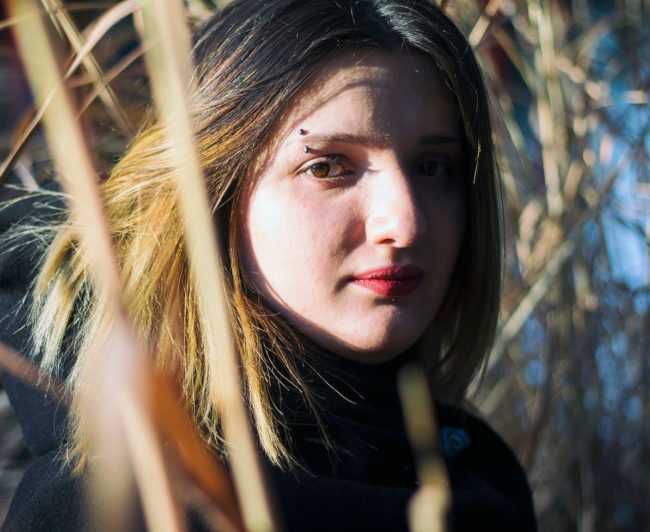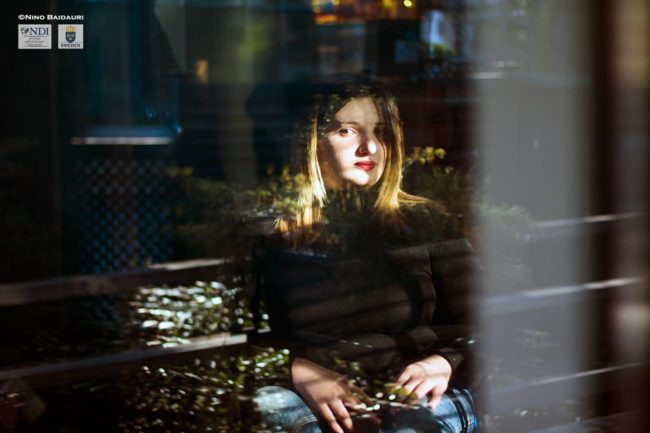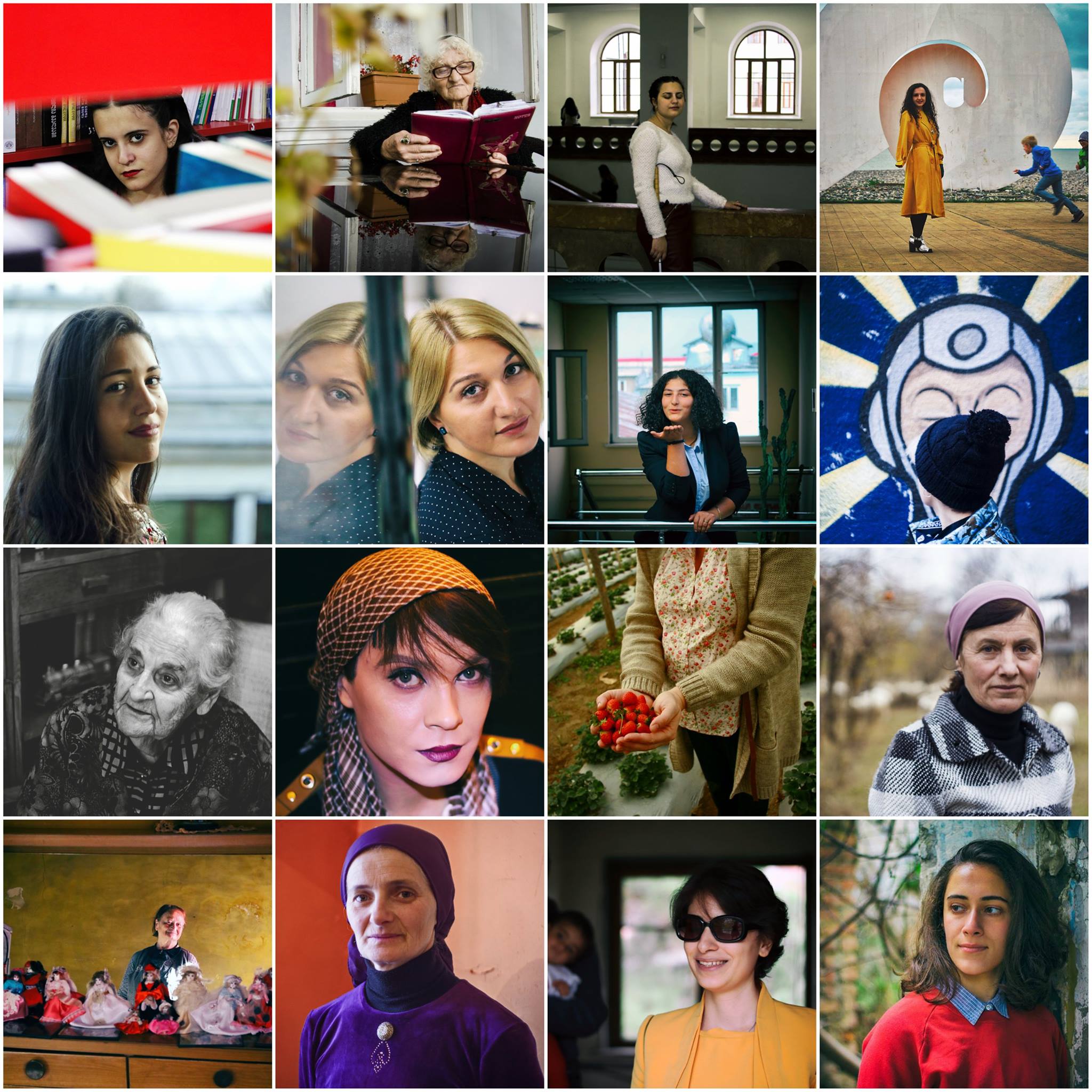
 Women in Georgia very often lack a voice of their own. Their opinions, feelings, dreams, aspirations, and achievements can be conveyed by others, often the men around them. The Women in Georgia project gives a voice to these women, allowing them to tell their own stories — in their own words. The project collected 150 distinct stories from women throughout the country. OC Media brings you a selection of these stories, translated into English and Russian. Below, in her own words, Salome Mikadze.
Women in Georgia very often lack a voice of their own. Their opinions, feelings, dreams, aspirations, and achievements can be conveyed by others, often the men around them. The Women in Georgia project gives a voice to these women, allowing them to tell their own stories — in their own words. The project collected 150 distinct stories from women throughout the country. OC Media brings you a selection of these stories, translated into English and Russian. Below, in her own words, Salome Mikadze.
‘I had symptoms from childhood. There was a period of time when I felt really bad. At first I began to limp; my condition became worse over time. Then they finally discovered what was happening. In the beginning I used a walking stick, but it was very hard, if I am not mistaken I was 10 when I first used the wheelchair. I was a child and when I first sat in it, I thought — Finally! I felt a kind of freedom, it felt good.’
‘I didn’t go to school. Teachers came to my home during the primary school period; then I went to the boarding school in Temka. There were many children with disabilities there. The name of the school was Natvris Khe (Tree of Wishes). Our parents would bring us in the morning and take us home at the end of the day, in the evening. It was like a daycare centre; they would help us study, we did exercises. I studied there for some time, and then my parents decided to take me to school; to an ordinary public school. They put me in the third grade. There was one ramp in the entrance and the bathroom wasn’t adapted. In the end, going to school was difficult for me, but it was the correct decision by my parents.’
‘It was a completely different environment from the very first day; everything was strange and unfamiliar to me. We were kids, and it wasn’t difficult for me and my classmates to communicate. However, I was never close with them, maybe because I was absent very often. I wasn’t driven to school, so when the weather was bad I was forced to stay home.’
‘I am an introvert, so it was much more comfortable for me to remain in my own space. I never sought social contact. The teacher used to reprimand me for this very often. She would tell my mother that I was a very closed off kid and it would be better if I became more active. It may have been that she thought I was this way because of my condition and never considered that it was my nature. It took me a long time myself to understand that there is nothing wrong with me and that this is just how I am.’
‘I remember our headmaster very well. She used to teach us Russian. I knew Russian well; I studied it by watching cartoons when I was young, and this is how I started to speak it. I had teachers who I remember very warmly and teachers who it is difficult to think back on even today, as they would find it easy to humiliate us in front of the whole class; they would insult every classmate, not only me.’
‘There were teachers who would give me high grades even if I didn’t come to classes, who would free me from exams and quizzes and tell me that I didn’t have to write them if I didn’t want to. At first, as a pupil, I was happy, but it also really upset me. I thought, why should I skip them?; I was there and could write. If I fail it’s ok; they should give me as many points as I deserve. These low expectations and a kind of protective attitude towards me were humiliating. Over time, I started to care less about such subjects and I didn’t study. As time passed my condition worsened.’
‘My parents were told my frequent absences were unacceptable, and they were asked to withdraw me from school. I would have a certificate of incomplete secondary school. My parents thought I could pass my exams externally, and they agreed. I was fed up of everything back then, and so I didn’t even protest. We made a big mistake, both my parents and I, when we agreed to this.’
‘After leaving school the situation in my family also got worse. We lost the house, as it was mortgaged to the bank. We used to move lot. Meanwhile, in 2011–2012, I started working for a non-governmental organisation. My parents weren’t working anymore so I was the only one with an income in my family — me with my salary and disability allowance.’
‘It helped us for a while. I always thought about studying, I always planned to get back to it, but the years passed and never managed it. Finally, at my mother’s request, I registered to sit my exams for 10th, 11th, and 12th grades. I passed my exams in every single subject. It was hell. I’m serious, my hair turned gray. But I killed it and managed to get a normal school certificate.’
‘When I was a kid, I always imagined the way my life would go — I would surely graduate from school — this was a must. Then I would surely go to university — also a must. I always wanted to be a psychologist. I dreamed that I would do this someday. This dream hasn’t gone anywhere, but now I have other things to think of and I have more responsibilities, like my fulltime job. I still think that I will have to manage it somehow, maybe even take some online courses.’
‘Now I work at Semek (The Georgian National Energy and Water Supply Regulatory Commission) as a teller at the call centre.’
‘The working environment is properly adapted, they had this approach from the beginning to encourage people with disabilities to apply, and in equal conditions, they will grant priority to applicants with disabilities.’
‘Employers generally have a stereotypical attitude towards people with disabilities. As a rule, they have lower expectations and try to avoid employing them, ignoring their skills, potential, and ambitions. So this is perhaps partly why you will most often meet them as tellers. When you don’t have any contact with people with disabilities, it is understandable that you have no information about them.’
‘Everyone has their own life. People filter things to take care of as well. Every person cannot think of everything on their own initiative. Not everything occurred to me immediately.’

‘When I first started to understand things like stereotypes, stigma towards disabled people, then I became more sensitive towards other groups as well: ethnic minorities, religious minorities, sexual minorities. Now I have a different approach. When I hear that a particular person has a problem because he or she is from certain group, I am very concerned. I have a really strong reaction, as it is like a personal insult for me. This is an automatic reaction. I know what it means and I can easily imagine myself in the shoes of this person.’
‘When you are a woman and you are with disabilities, it almost ends there. You don’t have a gender anymore. My flirting, as a rule, ends in the “friendzone”. Either I appear there or they do. I can’t escape it. When it comes to the issue of sexuality, it is not only about sex, it’s about an attitude, an emotional connection. When I think of all this, what could happen when you have an emotional connection with a person — I always remember the story of my friend, a girl with disabilities, who had a boyfriend.’
‘Her family was against it, but she still married him. Soon after, she left after he reproached her — “You know, I look after you”. It was as if the girl should have been grateful that the he considered her worthy of being with him.’
‘I was a teenager back then, but this story had a big influence on me. I always remember it and think that if someone close to me tells me something like that, a person who I allow to be so close — this would be a big thing for me, I probably wouldn’t be able to bare it. I don’t rule out that something could happen in the future, but today, when something might begin, I immediately remember this story.’
‘I cannot say anything definitive about my sexuality. Sometimes I am surprised by those who have a direct answer to this. I don’t think of this in advance at all. When I think about relationships, an emotional connection with a person is the most important thing for me. I don’t rule out that I may have this contact with someone of the same sex as me.’
‘If I reach the point where I am ready to take this step, to say that I am ready for a relationship with a person, then gender is secondary. To speak about my interests — I don’t know how relevant it is, but I am not interested in literature where they tell the story of heterosexual couple. It doesn’t attract me. When I realised this, I had a moment of surprise, it was strange.’
‘We people with disabilities, we break the image of the ideal people in an ideal world. This is why people prefer that we stayed somewhere together, far from their sight. It is the same with sexual minorities. Things can change, people’s awareness increases, but sometimes this can also be very ridiculous. When somebody runs to you and decides that you need help. In fact you may not need help at all, and they may even slow you down. In the end they may wish for your recovery. Of course they want what’s good for you, and now I laugh at such moments.’
‘We begin changes from within our own circles. I always say that when a person doesn’t do any harm to others, even if they have an identity which is not acceptable for you, this doesn’t mean they are bad people, and so you have to get rid of your attitude. No one asks you to love them, but groundless hate cannot bring any good to anyone.’
© 2017 Social project “Women from Georgia” implemented by the women’s initiative group “A Woman’s Voice”. (Project by: Maiko Chitaia; Ida Bakhturidze; Nino Gamisonia). Photo by: Nina Baidauri; Salome Tsopurashvili. The project is implemented with the support of the National Democratic Institute (NDI) and the financial support of Swedish International Development Cooperation Agency (SIDA). #womenfromgeorgia
We thank all the women who have contributed their life stories.




 8 March 2017
8 March 2017



